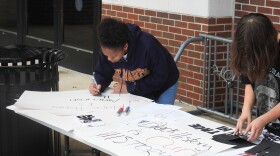Brain-computer interaction technology may sound like science fiction, but the University of Tennessee at Martin is hosting competitors in a worldwide hackathon competition focused on the field this weekend.
The University of Tennessee at Martin will be one of four host sites in the United States – and one of only 19 sites worldwide – for the spring BR41N.IO Hackathon, a worldwide competition where participants use brain-computer interface (BCI) technology. Those devices capture brain activity to use as an input to interact with technology. People can use BCI technology to control a video game character or virtually paint an image using their brain waves.
The Hackathon was created in 2017 to provide educational, research and development opportunities focused on BCI devices and explore the possibilities of using the technology in motor rehabilitation for stroke patients and people with disabilities.
Competitors will wear a BCI device called Unicorn, a fabric cap wired with electrodes that will non-invasively record brain activity. Those electrodes will record the release of electric signals in the brain, which the Unicorn will then examine and use as an input for a variety of tasks.
Participants will choose a predefined project to showcase how they trained the Unicorn. Projects using the BCI device include controlling an aspect of a game, flying a drone, manipulating household appliances or using apps on a smartphone.
Saman Sargolzaei is an assistant professor of engineering at UT Martin and a juror for the Hackathon. He said after the Unicorn device is trained on a user’s brain waves, it can allow people to interact with technology and their environment through only their thoughts.
“When you’re playing a game and [using] your cellphone, you’re using your motor capabilities. You’re using your fingers,” Sargolzaei said. “But in brain-computer interaction technology, we’re hoping to let the brain waves or thoughts control those motor capabilities.”
Sargolzaei said the future of BCI technology could be used for people with disabilities, such as potentially allowing them to talk to others using brain-to-speech or brain-to-voice technology.
“They’re going to be able to communicate with their surrounding environment,” he said. “The opportunities are going to be limitless when it comes to letting your brain interact instead of your actions.”
Competitors will virtually present their projects to an international jury this weekend to win cash prizes of up to $1,000.



